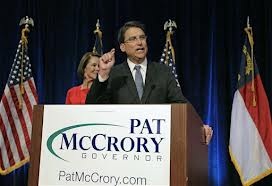Does pursuing a liberal arts degree at a public university these days lead to a job? According to newly minted Republican Governor of North Carolina, Pat McCrory, the answer is apparently “no.”
As reported in The Daily Tar Heel, published out of the University of North Carolina (UNC), in a radio talk show with conservative host Bill Bennett (former Secretary of Education in the Reagan Administration), the governor said: “If you want to take gender studies, that’s fine, go to a private school and take it.” He further said, “I don’t want to subsidize that if that’s not going to get someone a job. . . .It’s not based on butts in the seats but on how many of those butts can get jobs.”
The governor’s comment has, needless to say, stirred debate.
 UNC’s president, Thomas Ross, responded by saying the university’s value should not be measured by jobs alone: “. . .we prepare students with the talent and abilities to succeed in the workforce, because talent will be the key to economic growth. . .” Jan Boxill, a professor and chairwoman of the UNC faculty, said: “Education is more than just training people for jobs today. We help students become problem solvers and creators for the jobs of the future.”
UNC’s president, Thomas Ross, responded by saying the university’s value should not be measured by jobs alone: “. . .we prepare students with the talent and abilities to succeed in the workforce, because talent will be the key to economic growth. . .” Jan Boxill, a professor and chairwoman of the UNC faculty, said: “Education is more than just training people for jobs today. We help students become problem solvers and creators for the jobs of the future.”
McCrory’s apparent slam of the value of a liberal arts education appears to contradict his own undergraduate liberal arts education. He studied education and political science at Catawba College in Salisbury, North Carolina. While studying to become a teacher, however, McCrory fell into a different career. During college, he spent the summers working construction and reading meters for Duke Energy.
In 1978, McCrory graduated from Catawba College and received a North Carolina teaching certificate that year. However, he decided against teaching and instead went to work full-time for Duke Energy. A management training program put him through a rotation of digging ditches and climbing electric poles as well as stints in office jobs. He rose through a variety of recruiting and training jobs to become a senior adviser with Duke Energy’s Business and Economic Development Group. He spent 28 years with Duke Energy.
The Governor’s apparent rejection of liberal arts studies in a public university is clearly connected with job creation and the cost of subsidizing a public institution of higher learning. The national unemployment rate is close to 8%. In North Carolina the unemployment rate was 9.2% as of the end of December 2012; in 2010, it was closer to 12%. An improvement, certainly, but not good enough for McCrory who wants to put as much energy as possible into facilitating the public university system in his state to foster employment.
The Governor’s intentions are admirable, but his apparent blanket negative attitude towards liberal arts subjects is off the mark. When Professor Boxhill (above) says that a liberal arts education fosters problem-solving, she is right on the mark.
 Educator Robert Harris (http://www.virtualsalt.com/libarted.htm) points out “A liberal arts education teaches you how to think.” He adds: You will develop strength of mind and an ordered intellect. You will be able to think for yourself. The world becomes understandable.” Further, “A liberal arts education teaches you how to learn. College provides a telescope, not an open and closed book. The more you learn, the more you can learn. Old knowledge clarifies new knowledge. General knowledge enhances creativity.” And “A liberal arts education allows you to see things whole.”
Educator Robert Harris (http://www.virtualsalt.com/libarted.htm) points out “A liberal arts education teaches you how to think.” He adds: You will develop strength of mind and an ordered intellect. You will be able to think for yourself. The world becomes understandable.” Further, “A liberal arts education teaches you how to learn. College provides a telescope, not an open and closed book. The more you learn, the more you can learn. Old knowledge clarifies new knowledge. General knowledge enhances creativity.” And “A liberal arts education allows you to see things whole.”
To which we can add: The more you learn, the more you can earn!
According to a recently released study by the National Associations of Colleges and Employers (NACE) , “. . .three liberal arts majors had average starting salaries that topped $40,000 in 2012. They are: liberal arts and science/general studies, $43,000; History, 41,900; and Literature/letters, $40,200.”
NACE reports that “. . .starting wages for these majors [in the liberal arts] are significantly higher than those paid in 2011, up by 3.6 to 3.9 percent—hefty by today’s measures.” Yes, average salaries for business, computer science, and engineering graduates are still higher than education and humanities and social sciences, but the perspective that liberal arts majors are way behind the curve is obviated by the recent NACE report.
There is another aspect to the issue that bears some discussion: the narrow view that there is a general direct connection between one’s education and a prospective job. Certainly, if you want to be a doctor or dentist, you need to go to medical school. If you want to be an accountant, you need to study accountancy. If you want to be a military leader, you need to study military strategies and tactics. However, is it requisite that if you want to go into business you have to have an undergraduate degree in business? It might help, but if you don’t have the temperament for failure or a mind to envision the bigger picture, it won’t matter how many degrees in business you have. Moreover, all of the above require successful completion of courses in the liberal arts.
 And there are plenty of examples of highly successful business people who didn’t have degrees in business or never completed undergraduate college work in the first place: Howard Hughes (TWA and Hughes Tool Company), Ted Turner (CNN, among many other enterprises), Bill Gates (the visionary who started Microsoft; he dropped out of Harvard in 1975), and the late Steve Jobs (who dropped out of Reed College).
And there are plenty of examples of highly successful business people who didn’t have degrees in business or never completed undergraduate college work in the first place: Howard Hughes (TWA and Hughes Tool Company), Ted Turner (CNN, among many other enterprises), Bill Gates (the visionary who started Microsoft; he dropped out of Harvard in 1975), and the late Steve Jobs (who dropped out of Reed College).
These are rare exceptions, of course, but proof enough that there’s not necessarily a direct line between one’s major in college and a job.
One has to wonder if Governor McCrory’s highly hands-on experience at Duke Energy sullied his appreciation for the value and values garnered from a liberal arts education. One also has to wonder what his perspective would be if he had spent just one year as a teacher, the subject he had studied as an undergraduate.
Please write to me at meiienterprises@aol.com if you have any comments on this or any other of my blogs.
Eugene Marlow, Ph.D.
February 11, 2013
© Eugene Marlow, 2013


